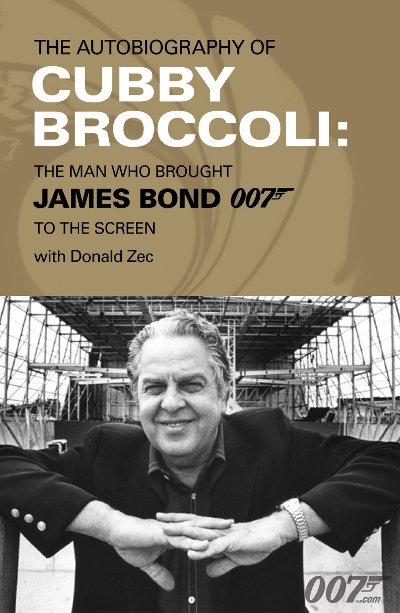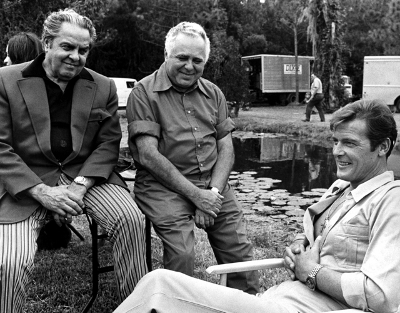|
When the Snow Melts

When
the Snow Melts is the autobiography of the legendary James Bond
producer Cubby Broccoli and was published in 1998 a couple of years
after his death. It was written with the help of his friend Donal Zec.
Broccoli was born in New York in 1909, his family apparently
responsible for bringing the first broccoli seeds into the United
States. I like to think the James Bond films were an apology of sorts
for making all those American children eat broccoli!
In When the Snow Melts,
completed just before his death, Broccoli looks back on his long life,
friendships with the likes of Howard Hughes and Cary Grant, his beloved
family, his struggles to get into the film industry, and, of course,
his decades producing James Bond films and thoughts on Connery,
Lazenby, Moore and what it took to keep cinema's most enduring
franchise flourishing in ever changing times.
Broccoli was known as a larger
than life producer who always put the budget up on the screen and could
get things done. He had to be both a diplomat and a showman to get the
Bond films made in all manner of locations around the world and always
seemed to have a solution to problems. When the huge 007 sound stage at
Pinewood burned to the ground in the seventies, Broccoli mulled this
disaster over for a moment and then ordered it to be rebuilt!
He had various jobs in his
younger days like a spell making coffins and selling Christmas trees
and endured many difficult times - including the death of his wife
Nedra which left him a widower with young children. It was the film
industry though that Broccoli always dreamed of being involved in and
through a lot of hard work he managed to get a foothold in the
business, eventually setting up a production company in Britain after
some dabblings in Hollywood.
The opening chapters of
biographies are sometimes are a struggle for me as my eyes tend to
glaze over when I'm given family trees and memories of days at school
etc but the book soon picks up when it moves onto the film industry and
Broccoli begins to pick up bits and pieces of work as he slowly climbs
the ladder. Broccoli talks about working with Howard Hawks and getting
a position at 20th Century-Fox and this is all good stuff.
He served in the US Navy during
World War 2 and then struck up a friendship with director Irving Allen
which led him on a path to Britain (where tax breaks made it a
favourable place to make films at the time) and eventually a certain
secret agent. Broccoli developed a fondness for Britain and through the
Bond series created a lot of important work for the domestic film
industry.
In the 1960s Broccoli went into
partnership with producer Harry Saltzman to bring Ian Fleming's James
Bond novels to the big screen and the rest is history. 'A Canadian
named Harry Saltzman held the option on Ian Fleming’s James Bond
stories and I offered him a partnership. He considered them a bit of
nonsense. I thought they offered all the basics in screen
entertainment: a virile and resourceful hero, exotic locations, the
ingenious apparatus of espionage and sex on a sophisticated level. It’s
true they had been around for a long time, and none of the leading
British and American producers had made a serious pitch for them. Harry
and I, with a budget of only $1 million, were rushing in where angels
had feared to tread.'
The book saves the James Bond
parts for the second half and there is some interesting stuff when we
get here. The author loved making Bond films and it was his life.
Broccoli includes a lot of memos from Ian Fleming with his instructions
on what the films should and should not contain and it's fun to read
these notes and comments. 'Atmosphere: To my mind, the greatest danger
in this series is too much stage Englishness,' instructs Fleming.
'There should, I think, be no monocles, mustaches, bowler hats or
bobbies or other "Limey" gimmicks. There should be no blatant English
slang, a minimum of public school ties and accents.'

There are about 30 pages of rare
photographs in the book including ones of Connery just after he'd been
cast. Broccoli notes that it was a battle to persuade their backers
that the unknown actor was the man for the job but he stuck to his guns
and Connery became the original (and for most the greatest) James Bond.
'The toughest problem of all,
though, was finding the actor to play James Bond. He had to be British.
Patrick McGoohan had been suggested, and might have made a fine Bond,
but he was strongly religious and was uneasy about sex and violence.
James Fox declined for the same reasons. Roger Moore had been touted,
but at that time I thought him slightly too young, perhaps a shade too
pretty. Other names entered the reckoning: Michael Redgrave, David
Niven, Trevor Howard. But one face kept coming back into my mind. He
was Sean Connery, a tall, personable man, projecting a kind of animal
virility and just the right hint of threat behind that hard smile. I
was convinced he was the closest we could get to Fleming’s super-hero.
We sent footage to United Artists in New York, who’d put up the $1
million. They sent back a telegram: ‘NO – KEEP TRYING.’ We wired back,
insisting that Connery was the man we wanted and we weren’t searching
any further.'
Broccoli has a few barbs at Sean
Connery in the book as Connery always used to slag him off, feeling he
was never paid enough money when he was Bond. Connery didn't even turn
up to Broccoli's memorial service when he died, unlike Moore, Brosnan
and Dalton, who all paid warm tributes. Broccoli feels one-time Bond
George Lazenby could have been an excellent 007 but it all went to his
head. Lazenby left after one film on the advice of an agent (who told
him Bond was dead) and Broccoli shrugs him off as a cocky young
Australian who had no idea what he was doing and made a big mistake.
Disappointingly but perhaps
understandably Broccoli tends to gloss over the end of Timothy Dalton's
tenure and not reveal too much about this. Licence To Kill had been a
relative flop in the United States and after the litigation that had
kept Bond off the screen for several years cleared Dalton stood down
and was replaced by Pierce Brosnan.
There has always been
speculation that MGM insisted that Dalton be replaced before the film
that would become GoldenEye went into production but I suppose that
even if this story were true Broccoli would not have told us given the
fact that he was good friends with Timothy Dalton. Broccoli liked
Dalton and apparently first tried to cast him as Bond in the late
sixties after watching a 24 year-old Dalton in The Lion in Winter.
This is an enjoyable if
undemanding autobiography that anyone interested in James Bond will be
happy to read. The book is full of famous names and interesting stories
and a bittersweet reminder that the real James Bond series probably
died with Cubby Broccoli. The Living Daylights was the last film that
Broccoli produced in a hands on fashion when he was alive.
Cubby comes across as a pleasant
chap who lived an extraordinary life throughout the book and it's
always interesting to be in his company for over 300 pages as he looks
back on his long career. When The Snow Melts is nothing amazing but a
book that Bond fans should enjoy.
- Jake
c 2016
Alternative 007
|

|


